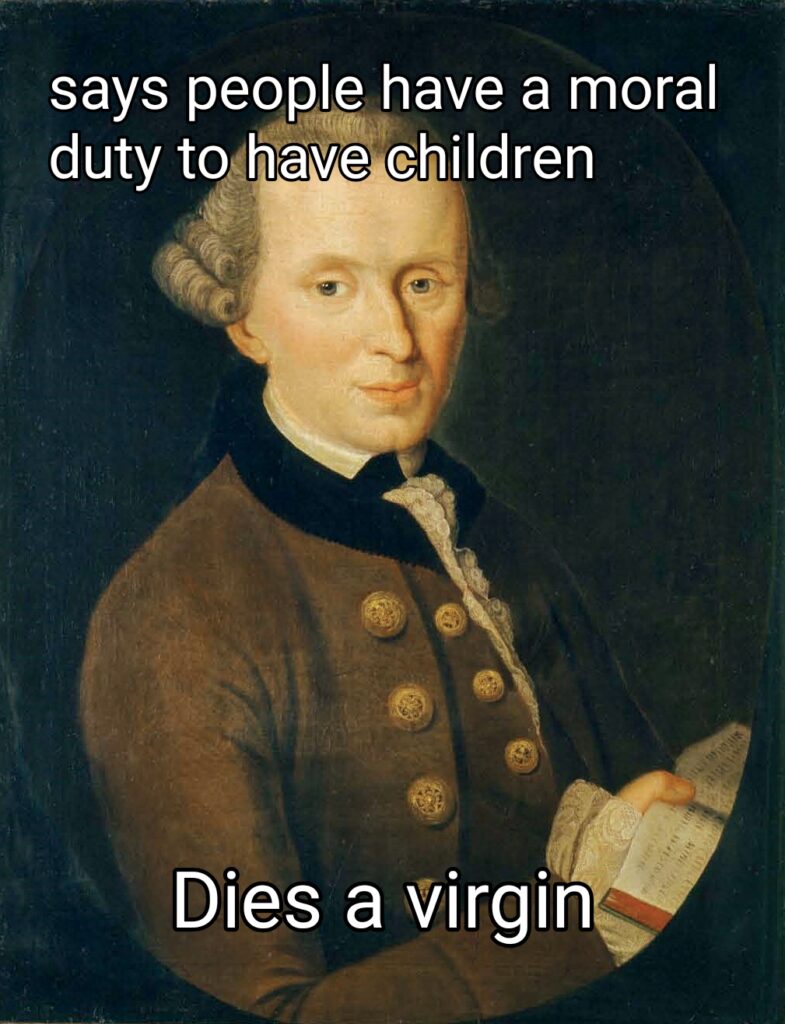Part of a series on ways to survive this dystopian nightmare
Just as individuals are required to adopt meanings suitable for their lived experiences, they are also required to identify ways of acting which are beneficial for themselves as individuals as well as the groups they belong to. This involves a renunciation of utilitarian attitudes in favour of a naturalized deontological moral framework instead. Although utilitarian principles claim to support good intentions in their attempt to benefit as many as possible, when applied at the societal level in contemporary capitalistic environments, an incentive to cooperate with or assist only those within a particular community arises which negatively influence individual behaviours. Those outside their in-group may suffer as a result of this utilitarian framework, and when applied to structures of governance, threatens the reciprocal relationship required between the organization and the humans it involves or interacts with. Therefore, we ought to avoid appealing to these types of zero-sum moral frameworks if we are interested in establishing peace and harmony between diverse groups of people (Habermas, ‘Religious Tolerance as Pacemaker for Democracy’ 254).
This naturalized deontological framework is implicitly suggested by Habermas in The Future of Human Nature, where one’s moral duty requires a consideration for other human beings, from all walks of life, as autonomous individuals with an inherent capacity for self-governance (33-34). While Habermas appeals to a naturalized version of Kant’s deontological principles to provide a perspective on the future of genetic engineering (Habermas, The Future of Human Nature 55), this secularization of Kantian morality is suitable for guiding reasoning and decision-making within liberal societies as well. By instilling a feeling of obligation to consider another’s perspective, citizens in pluralistic societies engage in “regulated relations of mutual recognition” (Habermas, The Future of Human Nature34), where individuals learn to recognize themselves as members of an inclusive yet culturally diverse society (Habermas, The Future of Human Nature35). While Habermas is interested in this framework as it pertains to liberal democracies, it is also appropriate as a universal norm as globalization motivates us to consider humanity as a whole, rather than a collection of separate states or regions. This avoids negative outcomes associated with utilitarianism, as Kant recommends not to appeal to a “formula of ends” since doing so treats individuals as a means to an end, rather than “as an end in himself” (Habermas, The Future of Human Nature 55). Thus, pluralistic or globalized societies interested in developing cooperation, tolerance, and peace between diverse peoples must instead view its population not as a mass to be controlled, but as a collection of human beings with an innate capacity for self-governance (Habermas, The Future of Human Nature 56).
This duty to others, however, still requires one to balance the needs of the self with the needs of others. Once these prerequisites are met, one is then able to take care of others, just as recommended when fixing oxygen masks for others if an emergency were to occur while flying on an airplane. Alternatively, if one were to try to help a drowning person if they themselves were not a strong swimmer, one risks their health and safety if the person needing rescuing is thrashing about in desperation. Thus, in addition to concerning yourself with your duty to others, focus on building a habit of reflecting on your own needs, desires, and lived experiences. Drawing explicit boundaries in this way is beneficial, even if it does impose limitations, provided the reasoning for doing so is transparent to others. Similarly, one must be open to considering critical feedback from others in their acts of self-reflection, as the boundaries we draw for ourselves nonetheless remain in social contexts. As a result, these efforts contribute a source of meaning to the lives of individuals as they work to better themselves within a wider community, a notion similar to eudaimonia (Aristotle 234).
To finalize with one last Kantian idea, it’s important to keep the faith even when all feels hopeless. He reminds us that the human species is advancing, morally and culturally, and that while it may be “interrupted” at times, it is “never broken off” (Kant 88). Furthermore, the unselfish goodwill one must demonstrate to others must be performed knowing that the beneficial outcomes or returns may not be readily apparent, however, they will nonetheless manifest in due time (Kant 89). Moreover, Kant believes that practical moral reason will eventually triumph over evil (Kant 92), as attitudes which support cooperative efforts give rise to emergent phenomena as effects from humans working together. Although Kant may have originally been appealing to religious ideals for his claims, we are justified in maintaining these beliefs based on the mathematical brilliance of John Nash as demonstrated in game theory. In this way, it could be suggested that even the laws of nature support this type of moral framework, suggesting its suitability for contemporary human societies.

Works Cited
Aristotle. Aristotle’s Nicomachean Ethics. Translated by Robert C. Bartlett and Susan D. Collins, University of Chicago Press, 2011.
Habermas, Jürgen. ‘Religious Tolerance as Pacemaker for Democracy’. Between Naturalism and Religion: Philosophical Essays, Polity Press. Ares.
—. The Future of Human Nature. John Wiley & Sons, 2003.
Kant, Immanuel. ‘On the Common Saying: This May Be True in Theory, but It Does Not Apply in Practice’. Kant: Political Writings, edited by H. S. Reiss, translated by H. B. Nisbet, 2nd ed., Cambridge University Press, 1991, p. 323. Ares.